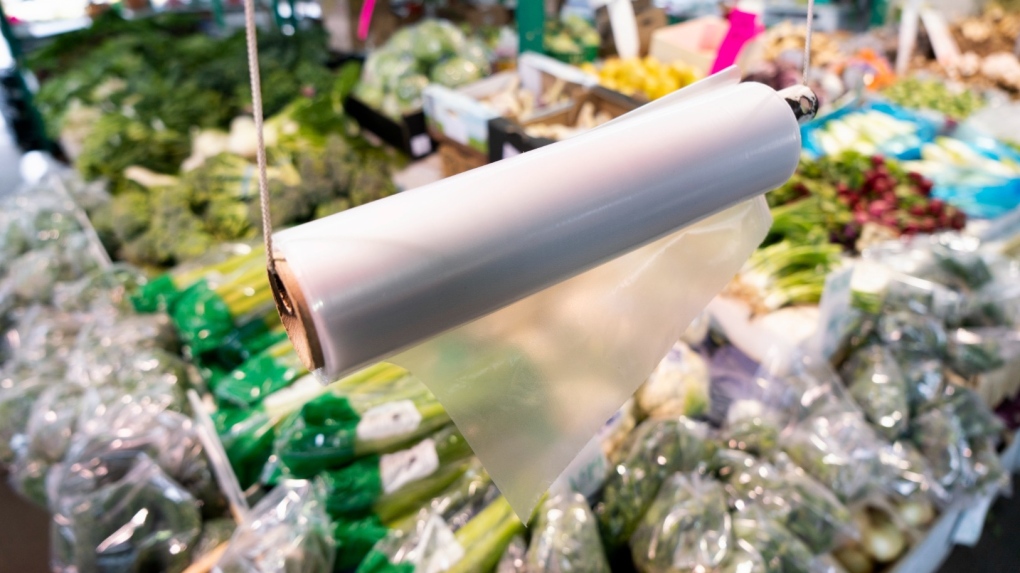Fresh fruit and vegetable producers warn proposed plastic reductions could spike grocery prices

[ad_1]
OTTAWA –
A proposed federal plan to curb plastic packaging is on a timeline fruit and vegetable producers are calling “problematic” and “unrealistic.”
In August, consultations for the pollution prevention planning notice for primary food plastic packaging were launched as the federal government searches for ways to reduce the more than 4.4 million tonnes of plastic waste thrown away every year.
“We hear it from Canadian from coast to coast to coast, that they hate seeing so much plastic wrapping,” said Environment and Climate Change Minister Steven Guilbeault.
The produce sector is concerned about the timelines of some of the proposed targets.
“Fresh fruits and vegetables are distributed and sold in bulk and/or plastic-free packaging,” the Environment and Climate Change Canada website reads. “75 per cent by 2026 and 95 per cent by 2028.”
“It’s probably not realistic,” said Tilly Stewart, director of citrus at Star Produce in Calgary. “The way it’s currently written will change the entire global food system.”
Stewart’s company packages fresh cut fruit, in plastic packages, for sale at grocery stores.
She insists the industry is working on ways to reduce its use of plastics, but currently biodegradable alternatives are too expensive.
“The technology just isn’t there yet,” Steward said. “(The) biodegradable (plastic) industry is quite greenwashed right now.”
A study obtained by CTV News from the Canadian Produce Marketing Association said the proposed rules are expected to pass on a 30 per cent additional cost to the consumer.
The higher prices come from transition to more expensive packaging materials, inefficiencies in shipping and increased food waste.
“Everybody gets upset about the wrap on cucumbers,” said CPMA President Ron Lemaire. “The challenge you have is you have two days at home with your cucumber, as opposed to 15 days.”
Karen Wirsig, the senior program manager for plastics at Environmental Defence, rejects the industry’s food loss projections.
“There is absolutely no evidence that we’re seeing a reduction in food loss and waste through the whole supply chain, because of that single use packaging,” she said.
Lemaire says the industry wants to find ways to have plastic packaging reused and recycled within a contained supply chain.
“It’s a complex food system,” Lemaire said. “One decision on packaging can influence a whole shift in how people behave and eat.”
 A roll of plastic bags is seen at a market in Montreal on Thursday, June 13, 2019. THE CANADIAN PRESS/Paul Chiasson
A roll of plastic bags is seen at a market in Montreal on Thursday, June 13, 2019. THE CANADIAN PRESS/Paul Chiasson
More than two-thirds of all produce consumed in Canada is imported, so there are concerns of a trade chill as well.
“You’re dealing with international trade partners, and manufactures that may just say ‘you know what, were not ready to shift our production lines,’” said Michael Zabaneh, Retail Council of Canada’s vice-president of sustainability.
Kaitlin Power, Guilbeault’s press secretary, said in a statement that the notice is “not a regulation.”
“The Government is committed to advancing solutions that avoid increasing the cost of food or food waste in collaboration with grocers, other businesses and stakeholders,” Power’s statement said. “We have been clear that we want to collaborate with producers and grocers on implementing solutions that exist, while avoiding negative consumer and environmental outcomes, and suggestions otherwise are inaccurate.”
A federal ban on the sale of plastic checkout bags, cutlery, stir sticks and other single-use plastics, comes into effect on Dec. 20, 2023.
The plan to reduce plastic packaging, is part of the government’s “zero plastic waste by 2030” strategy.
More than half of all the plastic waste thrown out in Canada is from packaging, according to Statistics Canada, and most of it ends up in a landfill, incinerators, or in the environment.
“We are over-wrapping products we have to stop,” Wirsig said. “And a great place to start is fruits and vegetables.”
The Environmental Defence plastic waste reduction expert says the government’s plan is aimed at the so-called “big five,” grocery store giants, Loblaw, Metro, Walmart, Costco and Sobeys owner Empire Co.
“The big five in Canada, that control a lot of their own supply chains,” Wirsig said. “Should be getting on re-usable (products) through their supply chain, and offering all of their fruits and vegetables in bulk where possible.”
Lemaire with CPMA warns, if some foods like blueberries are sold in bulk, there would be “astronomical food loss.”
Something even Wirsig agrees with.
“Obviously this doesn’t work for berries,” she said. “So when we’re going to 95% (plastic-free packaging) by 2028, we’re probably not including raspberries, and maybe not cherries.”
“But almost everything else could be done without plastic.”
[ad_2]